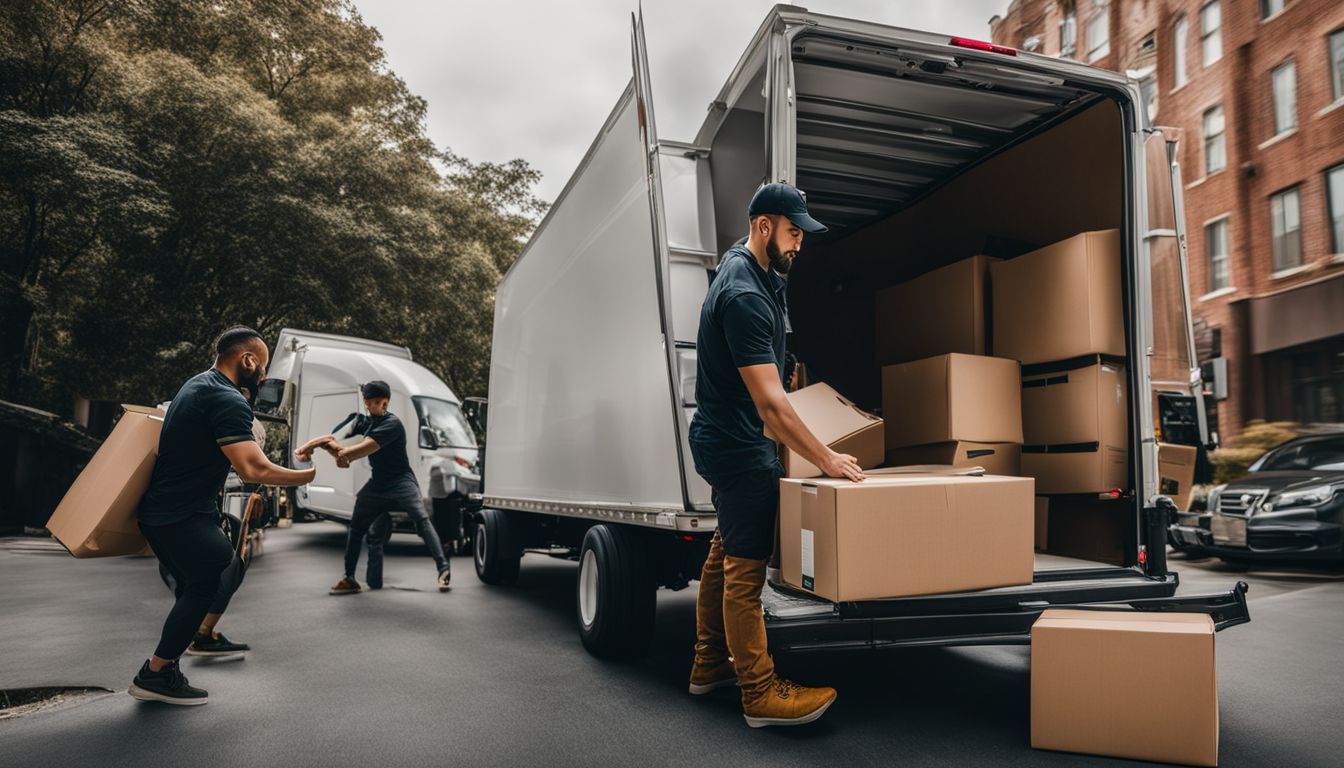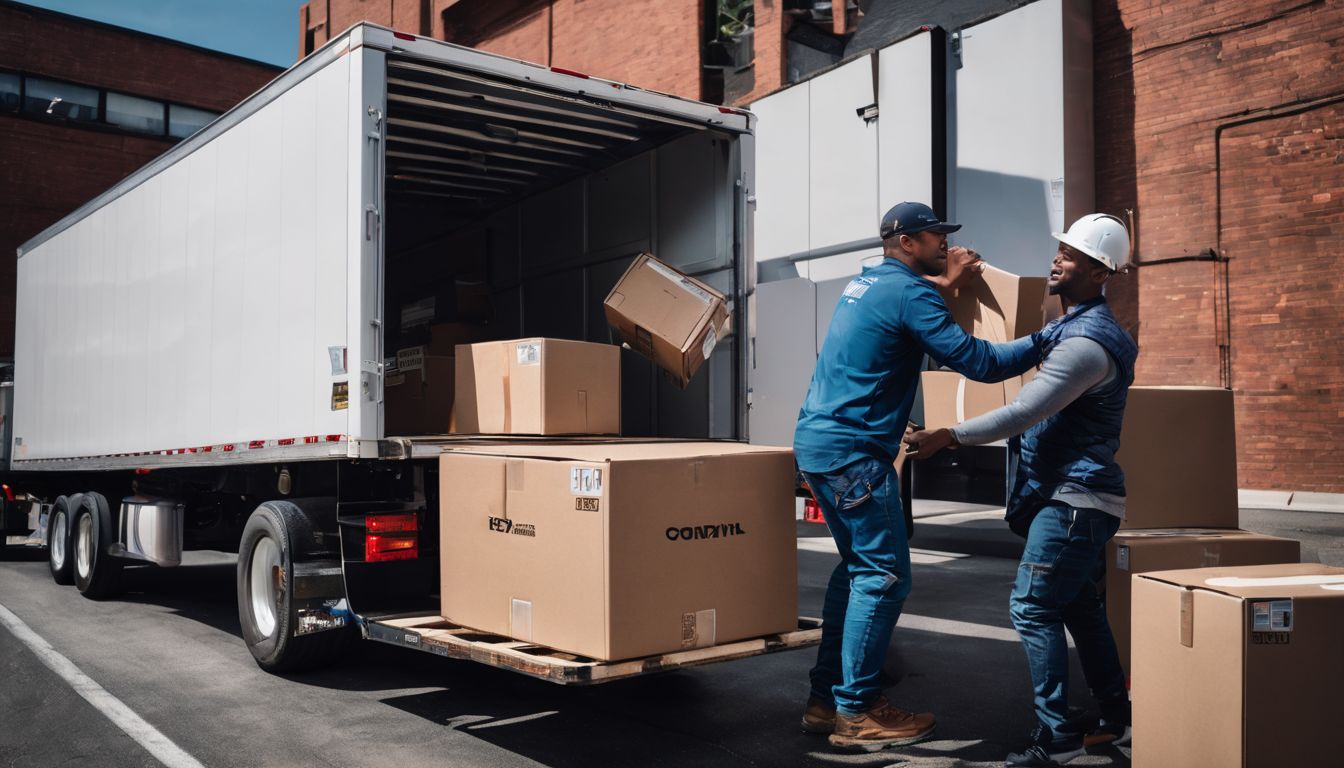Tips For Choosing A Moving Company

Selecting the ideal removal firm can often feel akin to a rather perplexing treasure hunt. We've all encountered that sensation of being swamped by options while harbouring concerns about handing over our cherished belongings into the hands of those we do not know.
With upwards of 40 million relocations occurring annually just within the USA, we've thoroughly investigated industry intricacies to offer you sage advice for navigating this journey effectively.
Our blog is brimming with expert guidance designed to ensure your moving experience is as seamless and hassle-free as possible. Shall we embark on this adventure together?.
Key Takeaways
- Look for a moving company with good insurance to keep your things safe.
- Get at least three written quotes from different movers to compare prices.
- Ask friends or family for moving recommendations they trust.
- Plan your move early to avoid busy times and find the best deals.
- Always read the contract carefully before you agree to anything.
How to Determine if You Need Professional Movers

Determining if you need professional movers is crucial before making a decision. Factors to consider include the distance of your move, the amount and value of your belongings, your physical ability, time constraints, and insurance coverage.
https://www.youtube.com/watch?v=VjYsQj2azhM
Consider the distance of your move

We need to think about how far our move is. Some moves are short and just down the street, while others take us to a whole new city or even across the country. Moves over 100 miles might be called "long-distance" by professional movers.
This distance can affect what services we choose and can change the price of moving.
Long trips often mean we need more help. Professional movers have experience with these kinds of moves, so they know how to handle our things safely over long distances. They also offer different services that can make a move easier for us, like packing and unpacking our stuff or giving us storage solutions if needed.
We want to pick a company that makes sure our belongings get to their new home without trouble, whether it's close by or far away.
Evaluate the amount, type, and value of your belongings

After thinking about how far we are moving, let's look at what we're taking with us. It's key to know how much stuff we have and what kind of things they are. Some items might be heavy or big, like furniture and appliances.
Others could be small but very valuable, like jewelry or art.
We also need to think about how much our belongings are worth in money terms. This helps decide if we want professional movers who know how to take care of valuable things during the move.
For special items that cost a lot or mean a lot to us, having pros pack and move them can give us peace of mind.
If we choose this route, it's smart to talk with movers about their packing services and costs. We'll want someone who has good experience packing so our things stay safe on the journey.
Asking for in-home surveys from top-rated companies is a good way to get an accurate idea of the moving costs based on what we own.
Take into account your physical ability

Moving can be tough on our bodies. Lifting heavy boxes and furniture is hard work. If we're not strong enough, we might get hurt. Some of us might have health issues that make moving even harder.
It's smart to think about how fit we are before deciding to move everything ourselves.
We need to choose what is best for our health. If the job seems too big, it could be better to let professional movers handle it. They know how to lift and carry things safely without getting hurt.
Now, let’s talk about time constraints and why they matter when planning a move.
Think about time constraints

We all know how precious time is, and moving houses can eat up a lot of it. If we have to move quickly, professional movers are our best friends. They know how to pack things fast, carry them out the door, and get them on the road in no time.
Plus, they're used to working with tight schedules.
Let's say you've got a new job and need to start soon, or your lease is up before you know it. That's when hiring movers really helps. We don't want to rush throwing our stuff into boxes at the last minute! Movers help make sure everything is sorted so we can keep calm and stick to our deadlines without losing sleep—or breaking anything important!
Consider insurance coverage

We need to think hard about insurance when picking a moving company. It's like wearing a helmet when you ride a bike; it protects us if something goes wrong. Most movers promise they have full insurance, which means our stuff should be safe if it gets broken or lost while they move it.
Let's make sure we ask for proof of their insurance and check with the actual insurance provider to see that the mover really has coverage. All good moving companies that follow the rules will show us this proof without any fuss.
If they’re properly insured, we'll feel better knowing we're not at risk of losing money if an accident happens during the move.
Questions to Ask When Vetting Moving Companies

Are estimates provided by the moving company? What are your responsibilities throughout the process? Are they insured, and how do they communicate with you during the move?
https://www.youtube.com/watch?v=QEd4hvOrj-o
Do they offer estimates?

We always ask moving companies if they give out estimates. This step is key to planning your budget for the move. Some movers provide free moving estimates, and you should get at least three quotes from different places.
It's best to make sure these quotes are written just for you. Keep in mind there are two types of estimates: a binding quote means the cost won’t change unless you add services, and a non-binding estimate might change based on actual moving day costs.
Make sure the company does an in-person or video walkthrough of your stuff before giving an estimate. This way, they can see what needs moving and give a more accurate price. And remember, getting guaranteed delivery dates along with these estimates helps set clear expectations for when your items will arrive at your new home.
What are your responsibilities?

You need to tell the moving company about all the stuff you want them to move. This includes big things like furniture and boxes, but also small items that might be easy to forget.
Make sure you explain if there are special things that need extra care. It's our job to brief the movers on what they'll be handling.
We must check that we've chosen a licensed and insured mover for our peace of mind. We're responsible for asking about their experience with moves like ours and how many years they've been helping people move.
Also, it's important that we ask for references from past customers to learn more about their service.
Are they insured?
When choosing a moving company, it's crucial to ensure they are insured. Valid licensing and insurance demonstrate the company's capability to manage your move efficiently and handle any unexpected situations.
It's important to inquire about the type of insurance coverage included in their quote, as this will safeguard your belongings during transit. Additionally, asking moving companies about the kind of insurance provided allows you to make an informed decision based on the extent of coverage offered.
Moving companies need valid licensing and insurance, which demonstrate their capacity to handle your move effectively and deal with unforeseen circumstances that may arise. Asking about the type of insurance coverage included in their quote is vital for protecting your belongings during transit.
Inquiring specifically about the kind of insurance provided gives you a clear understanding of what is covered and helps you make an informed decision based on the level of protection offered.
How do they communicate?
Communication is a vital aspect to consider when evaluating moving companies. When vetting potential movers, it's important to inquire about their methods of communication. Effective communication can include providing estimates, discussing responsibilities, and addressing insurance coverage.
Clear and prompt communication is indicative of a professional and reliable company. They should be able to promptly address inquiries and provide clear communication throughout the moving process.
It's essential to ask about the methods of communication the moving company uses, such as phone calls, emails, or in-person meetings. By establishing clear and effective lines of communication from the beginning, trust can be built between you and the moving company.
Understanding Moving Company Reviews
 moving company reviews on a laptop in a cozy home office." title="A person reading moving company reviews on a laptop in a cozy home office." class="awimage" />
moving company reviews on a laptop in a cozy home office." title="A person reading moving company reviews on a laptop in a cozy home office." class="awimage" />
When choosing a moving company, it's important to understand and consider moving company reviews. These reviews provide valuable insights into the experiences of past customers with the moving company.
By reading these reviews, you can gain an understanding of the quality of service, reliability, and professionalism of the movers. Look for customer reviews on trusted platforms like the Better Business Bureau (BBB), where you can find honest feedback and ratings about different moving companies.
Additionally, pay attention to specific details mentioned in the reviews, such as punctuality, handling of belongings, communication throughout the process, and overall satisfaction.
There are also other online review platforms that offer insight into various aspects, including hidden fees, cancellation policies, and electronic communications, which could be helpful in making informed decisions when selecting a moving company to hire.
https://www.youtube.com/watch?v=WR3fMzX2y74
Mistakes to Avoid When Choosing a Moving Company

Forgetting to ask about discounts, booking during busy times, not reading the fine print, not asking about additional fees, and not discussing the unloading process are all common mistakes that can be easily avoided when choosing a moving company.
These mistakes can lead to unexpected expenses and delays in your move.
Forgetting to ask about discounts
When gathering quotes from moving companies, it's crucial to inquire about any available discounts. Many movers offer discounts for various reasons, such as off-peak moving times or particular services.
Not asking about potential discounts can lead to missing out on cost-saving opportunities when choosing a moving company.
Discounts are commonly offered by most moving companies to attract customers and stay competitive. This oversight of forgetting to ask about discounts often results in missed opportunities to save money on your move.
Booking during busy times
When booking a moving company during busy times, it's crucial to plan ahead and make reservations early. Waiting until the last minute can limit options and lead to hasty decisions, potentially resulting in subpar choices.
Proper planning and research can help avoid mistakes and oversights that may occur due to a rushed selection process.
During peak moving seasons or busy times, such as weekends or the end of the month, reputable movers tend to get booked quickly. It's important to secure a slot with your preferred moving company well in advance to ensure availability and secure the best deal.
Not reading the fine print
When choosing a moving company, not reading the fine print can lead to common mistakes and pitfalls. It's important to thoroughly review the terms and conditions of the contract to avoid unexpected charges or issues.
This includes understanding potential additional fees, insurance coverage, and any special requirements for items like fragile belongings or valuable antiques. Failing to pay attention to these details can result in unpleasant surprises during the moving process.
Common issues when moving include scams involving demanding a deposit, not inspecting the household before moving, and not assuming additional charges. Therefore, it's crucial to carefully read through all documentation provided by the moving company and ask questions about anything that may seem unclear.
Not asking about additional fees
Before finalising the moving company, it's crucial to discuss potential additional fees and charges. Failing to do so could lead to unexpected expenses that may strain your budget.
It's essential to ask about any extra costs for services like packing, unpacking, or carrying items up stairs. Not mentioning these details can result in financial surprises during the move, impacting your overall relocation experience.
When choosing a moving company, make sure to inquire about any possible additional fees upfront. This proactive approach will help you avoid unforeseen costs and ensure a more transparent and manageable moving process.
Not discussing the unloading process
When considering a moving company, it's vital not to overlook discussing the unloading process. Forgetting this crucial aspect can lead to a myriad of issues during the relocation.
It's essential to consider how the movers will handle unloading your belongings at your new location and ensure that their approach aligns with your expectations and requirements. Additionally, different companies may have varying procedures for the unloading process, so it's imperative to discuss this beforehand.
Failing to address the unloading process when choosing a moving company can result in unnecessary stress and complications on moving day. By factoring in this critical step during the research and selection phase, homeowners can avoid potential problems that may arise if the unloading process is not adequately discussed with the chosen movers.
Tips for Simplifying Your Move

Moving is stressful, but here are some tips to simplify your move:
- Start early: Begin planning and organising your move well in advance to avoid last-minute stress. Make a checklist of tasks and deadlines.
- Declutter: Sort through your belongings and get rid of items you no longer need or use. This will lighten your load and make packing and unpacking easier.
- Pack strategically: organize and label your boxes by room to streamline the unpacking process. Use quality packing materials to protect your belongings.
- Notify important parties: Inform utility companies, schools, healthcare providers, and any other relevant parties about your change of address.
- Hire professional movers: Consider hiring experienced movers who offer packing and unpacking services to save time and effort.
- Take care of yourself: Remember to take breaks, stay hydrated, and get enough rest during the moving process to avoid burnout and exhaustion.
The Importance of Researching Licenses and Insurance

When choosing a moving company, it's important to research their licences and insurance. This ensures that the company meets legal requirements for operating as a mover. Verifying their licence with the Driver and Vehicle Standards Agency (DVSA) and checking their insurance coverage helps safeguard your belongings during the move.
For long-distance moves, especially interstate ones, confirming the mover's GB DOT number and understanding their valuation coverage are crucial. This provides peace of mind knowing that you're entrusting your possessions to a licensed and insured moving company, reducing the risk of any potential issues during transit.
It's essential to verify both licence and insurance status before finalising your decision on which moving company to hire. This step helps protect you from unscrupulous or uninsured movers while ensuring that all legal requirements are met for a smooth relocation process.
Understanding these aspects can help you make an informed decision when selecting a reputable moving company for your relocation needs, without any unnecessary risks or stress.
Understanding the Average Cost of Hiring a Moving Company

Having discussed the significance of researching a moving company's licences and insurance, let's delve into the financial aspect of your move. Understanding the average cost of hiring a moving company is crucial to setting a budget and expectations. Here's what you need to know:
The average cost of hiring movers for a local relocation of a two- to three-bedroom home runs close to £1,250, factoring in the standard weight load of about 7,500 pounds. This ballpark figure helps in getting a rough idea of what expenses might look like for a move of this scale.
Expect to pay around £2,100 for local moves involving a three-bedroom house. The cost naturally escalates with the addition of more rooms, as this typically means more belongings to transport.
Long-distance moves for the same three-bedroom house average between £600 and £900. These costs are considerably higher due to the greater distances involved and the additional labour and logistics required.
An hourly rate of approximately £109 is the going rate for local moves covering less than 50 miles. This is a useful metric to have when comparing the affordability of different moving services for short distances.
The final price tag will reflect the move's size, the journey's length, and the variety of services the moving company provides. Personalization of services can lead to an increase or decrease in overall costs.
Factors such as property accessibility and the total volume of items being moved also play into the cost. Narrow hallways, multiple stories, and bulky furniture can all bump up the price.
Comparing hourly rates among different moving companies is advisable to ensure you're getting the best value for money. It allows for a clear cost-benefit analysis of the services offered.
Probing into the size and scope of your move is imperative. It's all about matching the right service to your specific needs, which involves asking targeted questions of potential movers.
Understanding these cost factors will empower us to make informed decisions and select the moving company that best fits our budget and requirements.
Tips for Hiring Quality Movers

When hiring quality movers, it's important to get recommendations from friends or family, ask important questions about their services and pricing, check references to ensure reliability, and be aware of any additional costs for packing.
Understanding insurance options and valuation protection is also crucial to a successful move.
Get recommendations
When choosing a moving company, it's important to seek recommendations from trusted sources such as friends, family, and employers who have had positive experiences with movers in the past.
Their insights can provide valuable guidance and help you narrow down your options to find a reliable and reputable moving company. Additionally, checking online reviews and ratings from previous customers can offer further assurance of the moving company's track record and reliability.
Asking for recommendations from people you trust can give you firsthand insights into the quality of service provided by different moving companies. Taking the time to gather these recommendations can ultimately lead you to make an informed decision when selecting a moving company for your upcoming relocation.
Ask important questions
When considering a moving company, it's important to ask about their licensing and experience. This can help in gauging their reliability and capability for the specific type of move you need.
Inquiring about the cost and services included is also crucial for budgeting and avoiding unexpected surprises on moving day.
Furthermore, asking detailed questions about insurance coverage, estimates, and communication methods will ensure a smooth and transparent process. By obtaining comprehensive information upfront, you can make an informed decision when choosing a reputable and trustworthy mover.
Understanding your responsibilities is equally essential to avoid any misunderstandings during the moving process.
Check references
After asking important questions, the next step is to check references. References are crucial when hiring quality movers. It's recommended to ask for a list of three customers from the local area who have moved in the past three months.
Verifying references is essential when considering potential moving companies. Checking references and online reviews is essential to ensuring that the moving company is legitimate and reliable.
It's advised to compare moving companies by checking the reviews and ratings that people have left for them to gather feedback and make an informed decision.
Beware of packing costs
Packing costs can add up quickly when hiring professional movers, often inflating your overall moving expenses. It's worth considering packing yourself to save money on these additional fees.
Cheap movers may seem like a budget-friendly option, but they could sneak in hidden costs that end up outweighing the initial savings. It's essential to weigh the value and reliability of the moving company over just focusing on cost alone.
Remember, it's usually cheaper to pack your own items than to pay for inflated packing costs from the moving company. Hidden costs may arise with cheap movers, so consider overall value and reliability instead of just going for the lowest quote.
Understand insurance and valuation protection
When hiring a moving company, it's crucial to understand the insurance and valuation protection they offer. Released value protection is a basic coverage that some movers provide, but it only offers minimal protection for your belongings in case of damage or loss.
For specialty items or high-value possessions, considering full valuation coverage might be necessary. Understanding the claims process for valuation coverage is also important to ensure you can easily file a claim if needed.
It's essential to consider the cost and factors involved in obtaining moving valuation coverage. Different movers may offer varying levels of protection at different prices, so it's important to carefully evaluate your options and choose the right level of protection for your specific needs.
Frequently Asked Questions About Hiring Movers

When hiring movers, it's essential to clarify any doubts you may have. Below are some common questions to ask moving companies:
- What types of insurance do you provide, and what is covered under each option?
- Can you provide a breakdown of all costs involved in the move, including any potential additional fees?
- How will you protect my belongings during the move, especially fragile or high-value items?
- What happens if there are delays on the moving day? Do you have a contingency plan in place?
- Are there specific items that you cannot transport due to regulations or safety concerns?
- Can you provide references from previous customers who have used your services for a similar type of move?
- What measures do you take to ensure the safety and security of my possessions during transit and at the destination?
- Are there any specific guidelines or requirements I need to follow before the moving day to facilitate a smooth process?
- How do you handle complaints or issues that may arise during the moving process, and what is your resolution procedure?
- What is your availability for communication leading up to the move and on the moving day if I have questions or concerns?
Conclusion

In conclusion, choosing a moving company doesn't have to be overwhelming. The tips provided here offer practical and efficient strategies for making the best decision. By following these guidelines, you can ensure a smooth and hassle-free moving experience.
Thorough research, getting referrals, and obtaining written estimates are key steps in finding a reliable mover. Remember, starting early gives you time to compare options and avoid common pitfalls.
FAQs
1. What should I look for in a moving company?
Look for a licensed and insured mover with a USDOT number to ensure they are legitimate. It's also smart to check if they're part of the American Moving & Storage Association.
2. How do I get an idea of what my move will cost?
Get moving quotes from different companies. Ask whether they offer a flat rate or charge by weight and distance, especially for interstate moves.
3. Is it okay to tip the movers, and how much should I give them?
Yes, tipping movers is common if you're happy with their service. A good tip can be around $20 per mover for a day's work, but this can change based on your move size and satisfaction.
4. Can my home insurance protect my stuff when I'm moving?
Sometimes your home insurance may cover your things during a move, but always check your policy or talk to your insurance provider before you rely on this.
5. What happens if I need to cancel the moving service?
Always read through the cancellation policy carefully before you book services so that you understand any fees or rules about cancelling.

